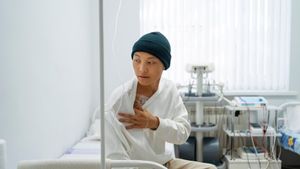YOGYAKARTA - Gonore is a sexually transmitted disease that is often taken lightly, which can cause serious complications if not treated immediately. So what are the signs of severe gonorrhea and need serious treatment?
Gonore infections that are already severe not only cause discomfort, but can also damage the reproductive organs and increase the risk of infertility. Any symptoms that indicate your gonorrhea is severe? Let's discuss it further.
Reporting from the medicalnewstory page, the term "super gonore" refers to an increase in the resistance of bacteria that cause gonore to treat antibiotics. This limits the choice of treatment and can make this sexually transmitted infection (IMS) much more difficult to cure.
According to the World Health Organization (WHO), there were 82 million new gonore infections worldwide by 2020. Although drugs to treat gonore have been available for years, these IMS-causing bacteria have become resistant to nearly all previously effective types of drugs.
Super gonore refers to increasing Gonore resistance to standard medicine. Gonoro is a common IMS that can previously be treated with various types of antibiotics.
BACA JUGA:
Gonore resistance to antibiotics has been around since the emergence of these drugs as a treatment for infection. Over time, the bacteria that cause infection, Neisseria gonorrhoeae, have become resistant to nearly all types of antibiotics.
Before continuing, also read the article that discusses whether Condoms Are Effective In Preventing Sexually Infectious Diseases? This Is The Percentage Of The Protection Level
Gonores may not cause symptoms in some people but can still cause serious health complications without treatment. When symptoms appear, they may be different in women and men.
Symptoms in women can include an increase in vaginal fluids, pain or a sensation of burning during urination, and vaginal bleeding between menstrual periods.
Meanwhile, the symptoms of gonorrhea in men can include colored (green, white, or yellow) fluids, swollen or painful tubes, and a sensation of burning when urinating.
Then Gonore rectal infections can lead to:
Neisseria gonorrhoeae bacteria are the cause of gonorrhoe, which spread through sexual contact. A person can be exposed to gonorrhea from having vaginal, anal, or oral sexual intercourse with an infected person.
A pregnant woman with a gonore can also transmit infections to her baby during childbirth, which can cause eye infections, meningitis, and other newborn complications.
Gonore testing can involve uretra or servics swabs, urine sampling, and throat or rectum swabs. One can also use a home test kit, which involves collecting samples at home and sending them to the laboratory.
Usually doctors will treat gonorrhore with a single dose of 500 milligrams Celsius that is injected into the muscles. If a person cannot receive a ceftriaxone, the doctor may use alternative treatment.
Patients also need to follow up on a healing test to ensure effective treatment due to increased resistance of gonore drugs. In addition, they also need to undergo another test 3 months after the initial infection, because general reinfection occurs.
Gonore diagnosis and early treatment can help improve a person's outcome, as treatment can often stop infection but cannot repair the permanent damage it causes.
In addition to severe gonorrhea signs, follow other interesting articles too. Want to know other interesting information? Don't miss it, keep an eye on the updated news from VOI and follow all the social media accounts!
The English, Chinese, Japanese, Arabic, and French versions are automatically generated by the AI. So there may still be inaccuracies in translating, please always see Indonesian as our main language. (system supported by DigitalSiber.id)















